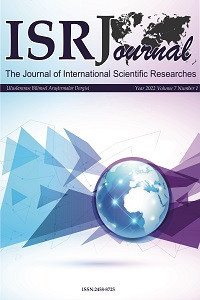Dijitalleşen Yükseköğretim: Bibliyometrik Perspektiften Eğitimde Dijital Dönüşüm
Anahtar Kelimeler:
Dijital Dönüşüm, Eğitim, Bibliyometrik Analiz
Digitized Higher Education: Digital Transformation in Education from a Bibliometric Perspective
Higher education institutions should give high priority to keeping up to date by studying how the business environment reflects the technological and social developments brought about by digitalization. This will enable future generations to take advantage of technological inventions for research and teaching. The implementation of the digital transformation approaches brought by Industry 4.0 in higher education has led to the creation of a technologically-supported education area in higher learning. In the educational dimension of this digital transformation, there is a need to organize complex relationships between existing structures and technologically supported structures. The aim of this article is to examine the literature of digital transformation in education and to identify the current state of affairs. In this context, filtering was carried out using the keywords “digital transformation” and “education” in the Web of Science database. A bibliometric data analysis was carried out through VOSviewer by downloading the data set obtained as a result of the filtering. The analysis found that the pandemic had an impact on the increase in the number of publications in literature, and the most common type of text was the article. In addition, the most broadcasting country is Russia, and the most commonly used keywords in terms of conceptual unity are digital transformation, higher education, education, digitization and COVID-19.
Keywords:
Digital Transformation, Education, Bibliometric Analysis,
___
- Alkhatlan, A. ve Kalita, J. (2018). Intelligent tutoring systems: A comprehensive historical survey with recent developments. arXiv preprint arXiv:1812.09628.
- Arnold, P., Prey, G., & Wortmann, D. (2015). Digitalisierung von Hochschulbildung: E-Learning-Strategie (n) noch up to date? Zeitschrift für Hochschulentwicklung.
- Arslan, K. (2020). Eğitimde yapay zekâ ve uygulamaları. Batı Anadolu Eğitim Bilimleri Dergisi, 11(1), 71-88.
- Avella, J. T., Kebritchi, M., Nunn, S. G., & Kanai, T. (2016). Learning analytics methods, benefits, and challenges in higher education: A systematic literature review. Online Learning.
- Barnes, S. J. (2020). Information management research and practice in the post-COVID-19 world. International Journal of Information Management.
- Bautista, A. S., & Lissen, E. S. E-learning in 15 days. Challenges and renovations in Primary and Secondary Education of the Republic of Croatia during the COVID-19 crisis. How have we Introduced distance Learning? Revista Española de Educación Comparada, (36), 181-195.
- Benavides, L. C., Arias, J. T., Serna, M. A., Bedoya, J. B., & Burgos, D. (2020). Digital transformation in higher education institutions: a systematic literature review. Sensors.
- Carroll, N., & Conboy, K. (2020). Normalising the “new normal”: Changing tech-driven work practices under pandemic time pressure. International Journal of Information Management.
- Cabinet Office. (2020). Society 5.0. Retrieved from https://www8.cao.go.jp/cstp/english/society5_0/index. html#container
- ISSN: 2458-8725
- Yayın Aralığı: Yılda 3 Sayı
- Başlangıç: 2016
- Yayıncı: Salih YILDIZ
Sayıdaki Diğer Makaleler
Hazır Giyim Sektöründe Marka Tercihlerinin Markov Zincirleriyle Öngörülmesi
Yeliz ŞAFAK, Vedat SAĞLAM, Murat SAĞIR
Akış Deneyiminin Anlık Satın Alma Niyeti Üzerindeki Etkileri: E-Perakendecilikte Bir Uygulama
İşyerinde Haset ile Yaşam Doyumu Arasındaki İlişkide Bilgi Paylaşımının Düzenleyici Rolü
Bir Tekstil Perakendecisinin Müşterileri İçin RFM Modeli ile Müşteri Segmentasyonu
Samet KANCA, Tuncay ÖZCAN, Yakup ÇELİKBİLEK
Lider Üye Etkileşiminin Bir Öncülü Olarak Bağlanma Stilleri
Veri Zarflama Analizi ile Enerji Şirketlerinin Etkinlik Değerlendirmesi
VZA Yöntemi ile Kamu Hastanelerinin Performans Değerlendirmesi
Tugce Hanım ERSOY, Polathan KÜSBECİ
